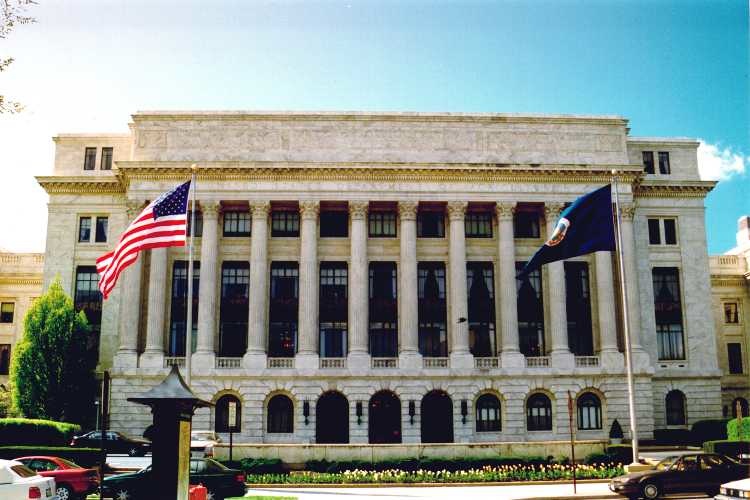The U.S. General Services Administration has issued a Request for Qualifications seeking developers who can provide construction and development services in exchange for the GSA Regional Office Building and Cotton Annex, both located in Southwest Washington, D.C.
These services would be used to help GSA consolidate about 1,500 regional staff from the Regional Office Building into the GSA headquarters located at 1800 F St., NW and renovate up to three historic buildings at St. Elizabeths campus in Southeast Washington.
This action will allow GSA to leverage the value of outdated and underperforming properties to provide the government with efficient modern office space to better serve our current needs.
Last year, the agency issued a Request for Information (RFI), soliciting innovative ideas from the development community to help the agency gather possible development scenarios that provide cost savings, space, efficiency, and modernization solutions for federal agencies located at Federal Triangle South.
“The Federal Triangle South project is an opportunity to reexamine how the federal government uses these buildings and reassess how this space fits into the surrounding community,” said GSA Administrator Dan Tangherlini. “This action will facilitate the city’s efforts to transform this precinct that is dominated by federal office buildings, into a mixed-use neighborhood that will both provide for a modern workplace for federal employees and create a vibrant, diverse, and special community of its own.”
GSA’s action supports the vision for Federal Triangle South identified by the National Capital Planning Commission’s Southwest EcoDistrict -- a sustainable community stretching from the National Mall to the Southwest Waterfront.
The vision includes a number of federal buildings and seeks to reduce costs by overhauling these outdated and underperforming assets, developing state-of-the-art green facilities, and encouraging mixed-use and improved infrastructure. The deadline for RFQ questions is April 17, 2014. Responses are due by May 22, 2014. The RFQ is now posted on Fed Biz Opps.
Reducing the Federal Footprint & Increasing Efficiency
The Obama Administration has set aggressive goals for using federal real estate assets more efficiently, and GSA has increased its efforts to help federal agencies identify underutilized properties and move them into the disposal process.
The Federal Triangle South RFQ is part of GSA’s ongoing effort to get underperforming federal facilities, such as the Cotton Annex, off of the government's books, while creating the greatest possible value for taxpayers. It would also allow GSA to consolidate its employees in the National Capitol Region into one building, the 1800 F St. NW headquarters. This would not only cut costs and reduce energy consumption, but also maximize workplace efficiencies by bringing employees into GSA’s Total Workplace program.
(http://www.gsa.gov/portal/content/189811)
Related Stories
Resiliency | Sep 3, 2024
Phius introduces retrofit standard for more resilient buildings
Phius recently released, REVIVE 2024, a retrofit standard for more resilient buildings. The standard focuses on resilience against grid outages by ensuring structures remain habitable for at least a week during extreme weather events.
Adaptive Reuse | Aug 28, 2024
Cities in Washington State will offer tax breaks for office-to-residential conversions
A law passed earlier this year by the Washington State Legislature allows developers to defer sales and use taxes if they convert existing structures, including office buildings, into affordable housing.
Adaptive Reuse | Aug 22, 2024
6 key fire and life safety considerations for office-to-residential conversions
Office-to-residential conversions may be fraught with fire and life safety challenges, from egress requirements to fire protection system gaps. Here are six important considerations to consider.
Building Materials | Aug 19, 2024
Federal 'buy clean' construction materials label program unveiled
The U.S. Environmental Protection Agency announced a plan for implementing a new label program to boost American production of more climate-friendly construction materials and products. The label program will prioritize steel, glass, asphalt and concrete.
Reconstruction & Renovation | Aug 19, 2024
Movement to protect historic buildings raises sharp criticism
While the movement to preserve historic buildings has widespread support, it also has some sharp critics with well-funded opposition groups springing up in recent years. Some opponents are linked to the Stand Together Foundation, founded and bankrolled by the Koch family’s conservative philanthropic organization, according to a column in Governing magazine.
Government Buildings | Aug 19, 2024
GSA posts new RFI for enabling energy efficiency, decarbonization in commercial buildings
The U.S. General Services Administration (GSA), in collaboration with the U.S. Department of Energy, recently released a new Request For Information (RFI) focused on enabling energy efficiency and decarbonization in commercial buildings. GSA wants to test innovative technologies through GSA’s Center for Emerging Building Technologies.
Urban Planning | Aug 15, 2024
New York City begins first large-scale porous pavement installation
New York City is installing its first large-scale porous pavement installation along seven miles of roadway in Brooklyn. The project will keep 35 million gallons of stormwater out of the combined sewer system each year, according to a news release.
Government Buildings | Aug 14, 2024
GSA releases updated standards to move federal buildings toward zero emissions
The U.S. General Services Administration (GSA) recently released updated building efficiency standards for federal buildings. The mandatory design and construction standards and performance criteria apply to 300,000 federal buildings.
MFPRO+ News | Aug 14, 2024
Report outlines how Atlanta can collaborate with private sector to spur more housing construction
A report by an Urban Land Institute’s Advisory Services panel, commissioned by the city’s housing authority, Atlanta Housing (AH), offered ways the city could collaborate with developers to spur more housing construction.
Energy Efficiency | Aug 9, 2024
Artificial intelligence could help reduce energy consumption by as much as 40% by 2050
Artificial intelligence could help U.S. buildings to significantly reduce energy consumption and carbon emissions, according to a paper by researchers at the Lawrence Berkeley National Laboratory.

















